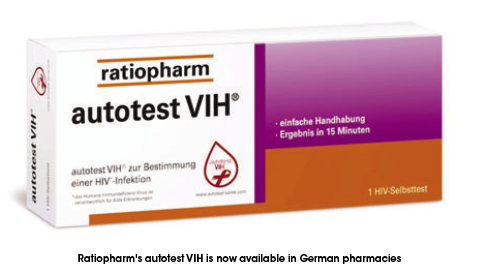HIV self-test hits German shelves
This article is powered by OTC Bulletin & The Rose Sheet
Executive Summary
Teva’s Ratiopharm is offering German consumers for the first time an OTC at-home HIV self-test following the approval by the Bundestag last month of an amendment to the German Medical Device Levy, the MPA, making these products available in pharmacies, drugstores and supermarkets.
Teva’s Ratiopharm is offering German consumers for the first time an OTC at-home HIV self-test following the approval by the Bundestag last month of an amendment to the German Medical Device Levy, the MPA, making these products available in pharmacies, drugstores and supermarkets.
Manufactured by French medical device specialists Autotest Santé and marketed by Ratiopharm in Germany, the Autotest VIH at-home HIV test has been available in pharmacies in the country since the beginning of October.
“As a pharmaceutical company that tries to make people’s lives better and healthier, we see the launch of our self-test as strengthening HIV prevention and the health competence of the German public,” commented Christoph Stoller, Teva’s general manager for Germany and Austria.
Marketing activities for Autotest VIH would be initially focused on supporting community pharmacists in giving advice to consumers buying the test, Ratiopharm told OTC bulletin, as it was a “completely unknown product” in Germany.

Further marketing planned
To this end, Ratiopharm said it had “planned a number of activities” for the remainder of 2018, including a newsletter for pharmacists and a website www.ichbinnichtnaiv.de offering information about how the product should be used and a ‘frequently asked questions’ section.
The next step, Ratiopharm revealed, would be a consumer-focused advertising campaign, with posters in doctor’s offices with the hastag #ichbinnichtnaiv, which translated as ‘I am not naïve’. This hashtag would then be used as part of “numerous other” advertising activities, Ratiopharm added, to raise public awareness of the importance of self-testing for HIV infection and the availability of Autotest VIH.
Taking only five minutes to complete and providing results within 15 minutes, Ratiopharm pointed out that the test – which worked by taking blood from the tip of the finger – was “already established in numerous European countries”.
Furthermore, Ratiopharm noted that scientific studies had shown Ta high level of sensitivity and specificity for the product, with 100% of HIV-positive patients receiving the correct result within three months of an infection occurring.
Consumers who buy and use the test are also able to access an HIV advice ‘hotline’ managed by Aids-Hilfe, an Aids and HIV counselling and advice service based in Vienna, Austria.
Aids-Hilfe has endorsed Ratiopharm’s product, noting that the European Union (EU) CE mark granted by French notified body LNE/G-MED meant that it had been assessed to meet high safety and health protection requirements.
“I am pleased that HIV self-tests are now freely available in Germany,” commented Michael Tappe, project coordinator at AIDS-Hilfe Germany. “This makes it easier for many people to take an HIV test. The earlier people know that they are infected, the better.”
Explaining the decision to restrict the sale of Autotest VIH to pharmacies, despite the amendment allowing for sale in drugstores and supermarkets, Ratiopharm said that “expert advice” remained an “important part” of selling HIV home-tests.
The firm’s decision will reassure the German pharmacists’ association, ABDA, which had earlier this year urged the country’s Ministry of Health, the BMG, to add a pharmacy-only restriction to its proposal to ensure patients would still have access to expert advice (OTC bulletin, 13 July 2018, page 14).
While the association welcomed the proposed amendment to the MPA, it warned that at-home tests “cannot replace medical advice” from trained pharmacy staff.
“As part of consultation, pharmacists also point out the limitations of HIV self-tests,” argued ABDA president Friedemann Schmidt. “Testing can sometimes produce false-positive results, leading to patients thinking they are HIV positive even when not infected.”
In the end, the Bundestag followed the recommendations of the BMG, which had anticipated such criticisms in its draft amendment proposal, pointing to a “broad consensus” among experts that patients could be trusted with HIV self-tests.
According to the Paul Ehrlich Institute, the BMG noted, the high levels of sensitivity and specificity of self-tests meant that there was “only a slight risk of physical stress and unknowing transmission due to false-positive test results”.
Furthermore, the BMG said studies had shown that forcing people to have consultations before accessing tests “deters some people from testing”. Around 14% of Germans infected with HIV “did not know about their condition”, it added, and in many cases HIV infections were only diagnosed “at an advanced stage”.
While it was “conceivable” that a small proportion of the German public could not carry out self-diagnostics, the BMG argued that this did not differ from the current situation, whereby people “do not always pick up their results” after being tested.
Elsewhere, the Austrian Ministry of Health, the BMGF, decided in June also to widen access to HIV self-tests in the country (OTC bulletin, 8 June 2018, page 13). By contrast to Germany, however, the tests are restricted to sale in Austrian community pharmacies.